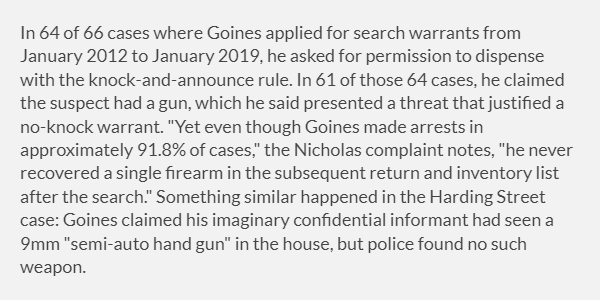TX Senate Committees May Only Meet 2-3 Times: The Texas Legislature's ramp up remains slow as Christmas; a few things are happening, but "not much" appears to be the new normal. On its website, the state prosecutors' association told its members, "don’t be surprised if many Senate committees hold no more than two or three hearings on Senate bills for the entirety of this regular session." Yikes! Usually, you might see 8 or so.
Vanishing Excuses for Class C Arrests: The Texas Observer's Arya Sundaram has a feature on Dillon Puente's arrest in Keller, TX, and the issue of regulating Class C arrests, which carry a maximum punishment of only a fine, not jail time; give it a read. Puente's father, who was pepper sprayed for recording his son's arrest on his phone, sued and agreed to a $200,000 settlement last week. Notably, the police unions haven't particularly updated their messaging on this topic. Back in 2015, when Sandra Bland was arrested for failure to signal a lane change and died in jail, cops could get away with saying such episodes were rare because no one knew for sure. Now, thanks to data gathered in her name, we know that, in 2019, Texas law enforcement reported 64,100 arrests at traffic stops for either moving violations (mostly) or municipal ordinances. That's more folks than were arrested for marijuana (see below)! Regrettably, departments haven't generally made these assessments for themselves. But at a time when courts have slowed, jails are packed and COVID continues to rage, it makes little sense to complicate Sheriffs' already tough job by arresting people for fine-only offenses. The Texas Legislature should put an end to it.Austin Action: Travis County District Attorney Jose Garza announced a more detailed version of new policies under which he'll run the office. See a Twitter string where Grits discussed them and my earlier commentary on Garza's initial push out of the gate after taking office. Meanwhile, the new civilian review board in Austin has started up and it's next meeting is Monday. They're going to hear a briefing on the review of Austin PD training video performed by a select-community panel. For more background, see here.
Goines Repeatedly Lied About Firearms to Get No-Knock Warrants: More charges have been filed against officers from Houston PD's Narcotics Unit, which your correspondent has argued should be shuttered. Reason has excellent coverage of just-filed litigation against Houston PD related to the killing of an innocent couple in the Harding St. raid. Here's a notable excerpt:
This basically amounts to getting SWAT-ed by the cops: Somebody (in this case, a narcotics detective) tells a lie about having a gun then, in the case of Dennis Tuttle and Rhogena Nicholas, cops break down the door and kill everyone inside.Homeland Security Planning Process a Consultants' Bonanza: A remarkable graphic appeared in the Texas Homeland Security Statewide Strategic Plan related to just how much such planning goes on in this state:
That's incredible: A consultant's bonanza, one wag rightly observed online. Who has read them all for consistency of vision, implementation, etc.? If the answer is "no one," or perhaps some beleaguered bureaucrats no one listens to in the bowels of DPS, then those gaps will only be revealed in implementation, as so many were, for example, during Hurricane Harvey. To an extent, I understand it: Texas is a big place, diverse across many different vectors. But wow!
Injunction-Junction, What's Your Function? Some of the targets of Harris County's civil prostitution injunction were dismissed from the case because prosecutors determined they were sex trafficking victims instead of perpetrators. This episode shows how nebulous those distinctions often are. I'm not particularly a fan of using civil law to constrain people's liberty when you don't have probable cause to arrest them, which is how these injunctions work. Kudos to Harris County Attorney Christian Menefee for rethinking the approach.
34 Years Later, A Chance for Justice: In Dallas, DA John Creuzot agreed with most of Ben Spencer's habeas claims, the Dallas News reported, boosting his chances for relief. Spencer was convicted of a carjacking and murder in 1987 but has always maintained his innocence. The trial court had earlier supported his actual innocence claims, only to have the Government-Always-Wins faction on the Texas Court of Criminal Appeals reject them in 2011. This new habeas writ is based on three witnesses who've since recanted their testimony.
DNA Losing its Shine as 'Gold Standard' Evidence: Practices at Austin PD's DNA lab were so error-filled and misguided that it would be "shocking to the conscience" to uphold Areli Escobar's murder conviction based on its disputed findings, found a judge in findings of fact for a habeas writ. See the order from Judge David Wahlberg, it's a doozy. Austin is considering "decoupling" its crime lab from the police department: This case is Exhibit A why that's a good idea. For more background on problems with interpreting mixed DNA samples, see the links rounded up here.
Sensory Penalties: A new book is coming out on "Sensory Penalties," exploring how prison is perceived through the five senses - a topic which arises plenty in current and former prisoners' writing, if seldom in a systematic fashion. But they want a $100 for it (academics!) and your correspondent balked at the price. So I was pleased to discover this panel featuring one of the authors discussing highlights. That's a start.
For the Reading Pile: Maurice Chammah sent me a copy of his new book on the death penalty, Let the Lord Sort Them Out, which was recently reviewed in the NY Times and features a section on my college pal Danalynn Recer. Looking forward to that. Thanks, Maurice! Meanwhile, with Austin considering decoupling its 911 call center from police department (as Houston and many other jurisdictions have done), I was interested to see this academic article, "Calling the Police: Dispatchers as Important Interpreters and Manufactuers of Call for Service Data." Perhaps their analysis will contribute to thinking through that process, as surely will the Vera Institute's recent work on the topic.


SB441 is a step backwards though
ReplyDeleteLet's hope all the slow walking kills bills like that, too.
ReplyDeleteHey, Grits.
ReplyDeleteDon't blame the academics for what the publishers charge for their work. This publisher, like Routledge, market them, I suspect, to college and university libraries. Limited run and limited distribution. Please believe me that the authors would prefer a lower price on their work. As for their royalties, they don't add up to much unless, I suspect, they can get a mass market publisher to pick it up. Think "Ghettoside" by Leovy. For what it's worth.
I don't blame them, I just can't afford many $100 books! And I buy more than my share. Thank God for libraries. :)
ReplyDeleteThat said, more academics should consider self publishing. With such low print runs (how many people can be paying $100 for this content?), it would give more control over distribution channels, and they're all having to do their own promotion, anyway.
SB441 is a bad bill and not backed by facts, but based in unfounded paranoia. It should never see the light of day. We do need to pass bills relating to climate control in Texas prisons (animals in shelters are protected, humans are not), independent oversight of the inept and corrupt Texas Department of Criminal Justice, and Earned Time Credit bills.
ReplyDeleteRe: DNA Losing its Shine as 'Gold Standard' Evidence
ReplyDeleteThe problems at the APD lab date back to at least 2009. Bill Gibbens (Forensic Services Manager) and Tony Arnold (Quality Assurance Manager) audited themselves in 2010 and stated that there were no problems. The Texas Rangers also audited the lab and stated that there were no problems. The FSC, who shirked legal responsibility and did not perform their own audit in 2010, instead regurgitated the results of Bill Gibbens, Tony Arnold, and the Texas Rangers audits in an abbreviated report.
The Quattrone Report published in September 2020, found 57 contributing factors leading to deficiencies within the APD quality assurance including:
Supervising inadequacies
Poor understanding of guidelines
Improper and inconsistent ways of addressing deviations from protocol
The overall structure of the DNA laboratory
Use of equipment or supplies that are not supported by manufacturer’s guidelines
I think it’s easy to say that the root cause of this catastrophic failure is incompetent oversight from the top. Get rid of Bill Gibbens, Tony Arnold, whomever performed the audit for the Texas Rangers, and the leaders at the FSC. These people furnished audit reports that are either demonstrations of complete incompetence, fraudulent, and/or illegal cover-up.
37.10. TAMPERING WITH GOVERNMENTAL RECORD. (a) A person commits an offense if he: (1) knowingly makes a false entry in, or false alteration of, a governmental record; (2) makes, presents, or uses any record, document, or thing with knowledge of its falsity and with intent that it be taken as a genuine governmental record;
Ex parte Escobar is only one case of at least 1000.
Grits,
ReplyDeleteThe problem with self-publication is distribution and reputation. A publisher already has a system in place for distribution and (some) marketing. Self-publishing means being responsible for one more part of the process. And, in many cases, it's about the publishing - and citations - for tenure, not the amount of sales. Simply having written a book that is published by a reputable publisher is CV credit where self-publishing may be (is) looked down upon in many fields. For history the gold standard seems to be university presses. For criminal justice, peer-reviewed papers seem to be that standard but a book is acceptable with any reputable publisher (Routledge or Basic is as good as a university press, it seems).
...But you are correct in that today's costs are outrageous! Maybe become a reviewer to obtain a few free books?
ReplyDeleteRE: the Goines warrants--shouldn't it be easy enough for us to identify the judge(s) who issued the warrants and hold them accountable, too?
ReplyDeletemamacita,
ReplyDeleteOriginally municipal judges, I believe, who are appointed.